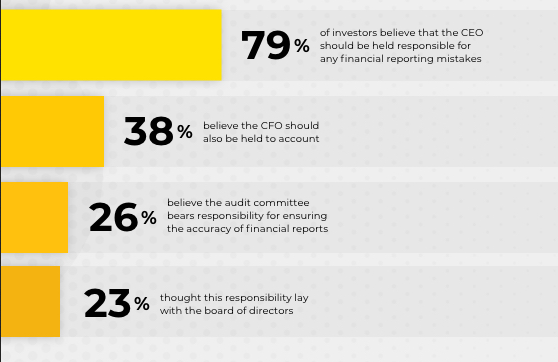Accounting
79% of Investors Think CEOs Should Be Accountable for Financial Reporting Errors
According to the survey, 63% of investors demand to know who is accountable if one of their portfolio companies misreports its finances. More than half of those surveyed added that they become frustrated when companies cannot communicate who is ...
May. 06, 2020

A global survey of institutional investors reveals that 79% of global investors believe that CEOs should be held accountable for a company’s financial reporting errors. Surprisingly, only 38% of investors feel that CFOs should be held to account. The survey was commissioned by accounting automation software maker BlackLine, Inc. (Nasdaq: BL.
BlackLine commissioned independent global research firm Censuswide to survey over 760 institutional investors across the world to gauge investor confidence in their portfolio companies when it comes to financial data, risk and reporting. The findings reveal an increasing lack of investor confidence in companies’ financial practices. This lack of confidence leads investors to rely on executives at the top for reassurance, looking to CEOs and CFOs to ensure that better reporting standards are applied.
According to the survey, 63% of investors demand to know who is accountable if one of their portfolio companies misreports its finances. More than half of those surveyed added that they become frustrated when companies cannot communicate who is ultimately responsible for signing off on financial reports. Surprise disclosures or restated financial statements are viewed especially poorly, with 98% of investors revealing they would be adversely impacted if a company misreports its finances.
Investor trust is reduced further when reporting processes are not clear; 38% indicate that a lack of visibility over how financial data is gathered, checked or analyzed makes them doubt its accuracy. More than half (58%) of investors are increasingly concerned by this lack of transparency, pointing out that the status quo is not sustainable in the longer term, particularly in unpredictable and unstable economic periods.
As businesses across the globe attempt to navigate the uncertainties created by the COVID-19 pandemic, it is more crucial than ever for business leaders to have a clear view of the numbers. In fact, the majority (92%) of investors agree that real-time visibility into finances is critical if companies want to stay competitive in the next 12-18 months. “This is a challenging time for business leaders globally; never before has an accurate and up-to-date view of company financials been so important,” said BlackLine CEO Therese Tucker. “The fact that investor trust is being impacted by perceived issues such as poor financial controls or lack of real-time visibility over the numbers is a concern in today’s modern finance and accounting world where strategic implementation of the right technologies can give CEOs and CFOs the peace of mind and business insight they need to instill trust in investors and other stakeholders.”
Encouragingly, many investors are now looking to technology to improve the way financial data is used and handled, as over two thirds (69%) believe artificial intelligence (AI) and machine learning will lead to greater accuracy and transparency in accounting and reporting. A further 58% also believe AI-driven bots will one day be able to calculate the best investment opportunities.
“Investors’ growing concerns over the details and accuracy of financial reporting is a call to action for companies to ensure they have a modern accounting approach in place – transparency, real-time insight and accountability are crucial,” continued Ms. Tucker. “In such a competitive and challenging global economic environment, ensuring visibility over real-time financial data will not only improve investor confidence, but will also feed into achievement of longer-term business goals.”
The full findings are outlined in ‘Accountability in Finance: The Buck Stops at the Top’, the second whitepaper from BlackLine on the subject. To download a complimentary copy, go here.
